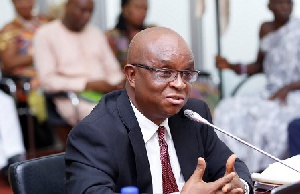Dr Archibald Letsa, Volta Regional Minister, has called on universities to extend teaching and learning beyond their campuses and make communities integral parts of tertiary education.
He said this would promote deepened learning experiences, broaden civic responsibility and better place students to appreciate the needs, values and general aspirations of communities.
Dr Letsa said this in an address read on his behalf by Reverend Johnson Avuletey, Deputy Volta Regional Minister, at the opening of the International Symposium on Global Community-Engaged Learning (GCEL) in Ho on Tuesday.
The symposium is to help participants understand GCEL from the perspectives and experiences of African faculties and community partners to form partnerships to stimulate development.
It was organised by ADANU, a Ho-based community development NGO in collaboration with the Michigan State University's (MSU) Office for Education Abroad with support from the Morse family.
Delegates from the academia, NGOs, development partners in education and community development are participating in the weeklong symposium from Ghana, Uganda, Tanzania, Kenya, Togo and the United States.
Dr Letsa said tertiary education should target producing students, who met the aspirations of communities and the nation.
He expected the symposium to come out with strategies to enhance the GCEL programme, leading to its scalability in the Region in particular and country as whole to benefit all stakeholders.
Dr Letsa assured the Michigan State University of safety of their students and entreated other foreign institutions to consider the Region under the Community-Engaged Learning Programme.
Mr Richard Yinkah, Executive Director of Adanu, said the symposium was a new concept, which aimed at demystifying the University faculty environment into a community classroom experience in "knowledge sharing give and take".
He was optimistic that the remolding would find dialogue and mutual benefits for students, faculties, lecturers, universities and community partners for sustainable development in the next five to ten years.
Dr Jamie Jonson, Director of African Studies Centre and Professor of History, MSU, said the symposium was to harness teaching and learning models in different ways in a collective partnership to provide valuable, high-quality education abroad that expanded opportunities for where, when and how students studied.
She said its mission was to ensure all students irrespective of demographic background, academic discipline, actively engaged in studies that advanced global learning and disciplinary scholarship.
Dr. Johnson said it was also to offer opportunities to network and engage with African universities and community partners in an effort to identify and develop potential collaboration and relationships.
Dr Eric Hartman, Executive Director, Centre for Peace and Global Citizenship said ethical GCEL entailed pedagogical intentionality and foster many interdependent partnerships.
He said GCEL would increase community activism, induce critical thinking and engender many possibilities.
Dr. Hartman said GCEL could therefore be the vehicle for profound transformation of students and community members indicating that global citizenship must be more than a marketing phrase.
General News of Wednesday, 26 June 2019
Source: GNA
Universities must not be limited to campuses - Archibald Letsa
Entertainment
















